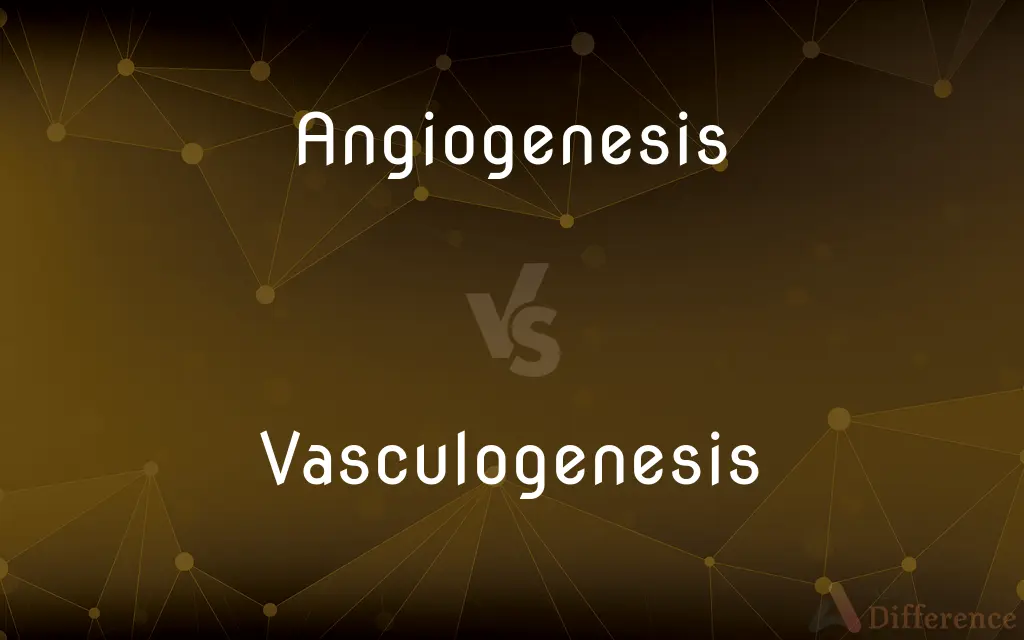Angiogenesis vs. Vasculogenesis — What's the Difference?
Edited by Tayyaba Rehman — By Fiza Rafique — Updated on September 29, 2023
Angiogenesis is the formation of new blood vessels from pre-existing ones, while Vasculogenesis is the formation of blood vessels in embryonic development.

Difference Between Angiogenesis and Vasculogenesis
Table of Contents
ADVERTISEMENT
Key Differences
Both Angiogenesis and Vasculogenesis are processes associated with blood vessel formation. Angiogenesis is the process by which new blood vessels sprout from existing ones. On the other hand, Vasculogenesis is the process by which blood vessels form de novo during embryonic development.
Angiogenesis primarily occurs during wound healing, inflammation, and in diseases such as cancer. Tumors, for instance, stimulate Angiogenesis to ensure they receive an adequate supply of oxygen and nutrients. In contrast, Vasculogenesis establishes the primary vascular pattern within embryonic tissues.
The mechanism behind these processes is also distinct. In Angiogenesis, endothelial cells, which line the interior of blood vessels, proliferate and migrate to form new vessels. In Vasculogenesis, mesodermal progenitor cells differentiate into angioblasts which coalesce to form the primitive vascular network.
It's important to note that while Vasculogenesis lays down the initial vascular framework in an embryo, Angiogenesis takes over postnatally to adapt and expand this network based on the body's changing needs.
In medical research, understanding Angiogenesis is crucial for developing treatments for conditions like cancer, where cutting off a tumor's blood supply can starve it. Understanding Vasculogenesis, on the other hand, is vital for regenerative medicine and understanding congenital vascular anomalies.
ADVERTISEMENT
Comparison Chart
Definition
Formation from existing vessels.
De novo formation during embryogenesis.
Occurrence
Wound healing, inflammation, tumors.
Embryonic development.
Cell involvement
Endothelial cells.
Mesodermal progenitor cells and angioblasts.
Significance in medicine
Cancer treatment, wound healing.
Regenerative medicine, congenital anomalies.
Mechanism
Proliferation and migration of endothelial cells.
Differentiation and coalescence of angioblasts.
Compare with Definitions
Angiogenesis
Formation of blood vessels from existing ones.
Wound healing accelerates with Angiogenesis.
Vasculogenesis
Formation of blood vessels during embryonic development.
Vasculogenesis establishes the primary vascular network in embryos.
Angiogenesis
Essential for tumor growth and nourishment.
Cancer treatments target tumor Angiogenesis to halt growth.
Vasculogenesis
De novo creation of the primitive vascular system.
In the early embryo, Vasculogenesis precedes other vascular processes.
Angiogenesis
Expansion and modification of the vascular network postnatally.
Postnatal development involves extensive Angiogenesis.
Vasculogenesis
Vital for establishing organ blood supply in embryos.
Heart development depends on early Vasculogenesis.
Angiogenesis
Process aiding in tissue repair and regeneration.
Angiogenesis plays a role in repairing damaged heart tissue.
Vasculogenesis
Differentiation of progenitor cells into angioblasts.
Vasculogenesis relies on the transformation of angioblasts.
Angiogenesis
Blood vessel sprouting stimulated by various factors.
Angiogenesis is enhanced in response to decreased oxygen levels.
Vasculogenesis
Base framework for subsequent vascular development.
Vasculogenesis sets the stage for future Angiogenesis.
Angiogenesis
Angiogenesis is the physiological process through which new blood vessels form from pre-existing vessels, formed in the earlier stage of vasculogenesis. Angiogenesis continues the growth of the vasculature by processes of sprouting and splitting.
Vasculogenesis
Vasculogenesis is the process of blood vessel formation in the embryo, occurring by a de novo production of endothelial cells. It is sometimes paired with angiogenesis, as the first stage of the formation of the vascular network, closely followed by angiogenesis.
Angiogenesis
The formation of new blood vessels.
Vasculogenesis
The formation and development of the vascular system, including the formation of blood vessels from endothelial cells.
Angiogenesis
The formation and development of new blood vessels.
Angiogenesis
The formation of new blood vessels
Common Curiosities
Are Angiogenesis and Vasculogenesis mutually exclusive?
No, while Vasculogenesis sets the initial network, Angiogenesis refines and expands it.
Why is Angiogenesis significant in cancer research?
Tumors stimulate Angiogenesis for nourishment; targeting this can starve tumors.
Is Vasculogenesis only observed in vertebrates?
No, it is observed in various multicellular organisms.
Does Vasculogenesis happen throughout life?
No, it mainly occurs during embryonic development.
Is Vasculogenesis related to organ formation?
Yes, it's crucial for establishing blood supply in developing organs.
Is Angiogenesis unique to pathological conditions?
No, it occurs naturally in wound healing and tissue regeneration.
Can Angiogenesis be artificially stimulated?
Yes, for purposes like wound healing and tissue regeneration.
Is impaired Vasculogenesis linked to birth defects?
Yes, it can lead to congenital vascular anomalies.
How do tumors promote Angiogenesis?
They release factors that stimulate nearby blood vessels to grow towards the tumor.
How do anti-angiogenic drugs work?
They block signals or pathways promoting Angiogenesis.
Can drugs inhibit Angiogenesis?
Yes, anti-angiogenic drugs are used in some cancer treatments.
Can Vasculogenesis occur in adults?
It's primarily embryonic, but there's evidence of it in specific adult situations.
Why is Angiogenesis important for athletes?
Enhanced Angiogenesis can improve muscle blood supply and performance.
What triggers Vasculogenesis in embryos?
The differentiation of mesodermal cells into angioblasts initiates it.
Are there risks in manipulating Angiogenesis for treatments?
Yes, excessive or inadequate Angiogenesis can harm tissues and organ functions.
Share Your Discovery

Previous Comparison
Motion vs. Move
Next Comparison
Correct vs. ExactAuthor Spotlight
Written by
Fiza RafiqueFiza Rafique is a skilled content writer at AskDifference.com, where she meticulously refines and enhances written pieces. Drawing from her vast editorial expertise, Fiza ensures clarity, accuracy, and precision in every article. Passionate about language, she continually seeks to elevate the quality of content for readers worldwide.
Edited by
Tayyaba RehmanTayyaba Rehman is a distinguished writer, currently serving as a primary contributor to askdifference.com. As a researcher in semantics and etymology, Tayyaba's passion for the complexity of languages and their distinctions has found a perfect home on the platform. Tayyaba delves into the intricacies of language, distinguishing between commonly confused words and phrases, thereby providing clarity for readers worldwide.















































